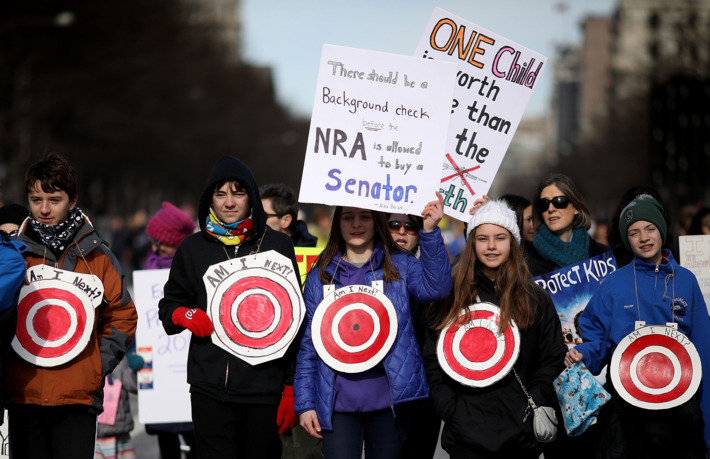Photo: Win McNamee/Getty Images
In the wake of the Stoneman Douglas mass shooting, the aftermath has launched a nationwide movement against gun violence. Student activists and their supporters have rallied in the hundreds of thousands across the country in acts of protest including school walkouts and at the end of last month, the March for Our Lives.
On the surface it’s hard not to agree with these organizers. As young people, they have brought a refreshing amount of honesty into political discourse by confronting mainstream politicians for being in the pocket of the NRA. They’ve managed to take the trauma they’ve faced and use it as a rallying cry for social change.
For much of the American public coming out against gun control is a no-brainer, but when we examine the policy demands set forth on behalf of the movement, there are apt critiques to be made. In doing so, we have the opportunity to pinpoint its shortcomings in securing conditions of nonviolence for all who are affected by it in order to bring about truly substantial change.
As of now, the proposed gun control policy would further criminalize the use of assault weapons as well as anyone considered likely to commit a mass shooting. Due to the fact that law enforcement disproportionately targets the marginalized and most vulnerable among us, this is cause of unease.
According to an article put on by the Black Youth Project, “When we talk about gun violence policy, especially in response to school shootings, we’re often talking about mandatory minimum sentencing, more police and security presence in schools, and background checks for those seeking to buy a gun. So even when those fighting for an end to the culture of violence in America have the best intentions, Black and Brown folks will most likely be the ones to experience violence at the hands of the state as a result, gun or not.”
In other words, much of the policy demands put forth make appeals for the strengthening of the state. This is not even something that is implied or incidental. Much of the materials circulated by March for Our Lives activists and its advocates for ending gun violence suggest this outright.
A video made on its behalf, features a compilation of military personnel advocating for a ban of assault rifles, which they say are essentially the same ones they used in armed conflicts abroad. They state, “There is no reason why anyone… other than military and law enforcement should have an assault weapon like this.” Yet, the notion that assault weapons don’t belong in the hands of civilians on American streets is pregnant with grotesque implication that this kind of violence is justifiable elsewhere, when it is afflicted upon other people.
Such is further exemplified in an article written for the Atlantic, by a radiologist who treated the victims Stoneman Douglas shooting who describes the extent of the injuries inflicted upon them. “The organ looked like an overripe melon smashed by a sledgehammer, and was bleeding extensively… One of the trauma surgeons opened a young victim in the operating room, and found only shreds of the organ that had been hit by a bullet from an AR-15, a semiautomatic rifle that delivers a devastatingly lethal, high-velocity bullet to the victim. Nothing was left to repair—and utterly, devastatingly, nothing could be done to fix the problem… It’s clear to me that AR-15 and other high-velocity weapons, especially when outfitted with a high-capacity magazine, have no place in a civilian’s gun cabinet.”Again, the unsettling suggestion here is that this kind of violence and injury is sometimes justified.
Using the horror and outrage stimulated by the incidence of mass shootings to strengthen the authority of the state, however, is really not surprising. In her article, “Precariousness and Grievability: When is Life Grievable?” philosopher and social theorist, Judith Butler asserts, “…our moral responses—responses that first take form as affect—are tacitly regulated by certain kinds of interpretive frameworks.” Her point is especially relevant when we consider whose lives are worthy of public expression of value – as implied through our grief when they are lost – because her analysis is largely focused on the disproportionate value of American lives to those who are killed at the hands of the American military abroad.
Butler cites the mainstream public response to 9/11 as an illustration of how public narratives are heavily controlled to fit or maintain the larger agenda of the state, in this case to justify the invasion of Afghanistan and later, Iraq. “After the attacks of 9/11, we encountered in the media graphic pictures of those who died, along with their names, their stories, the reactions of their families. Public grieving was dedicated to making these images iconic for the nation, which meant of course that there was considerably less public grieving for non-US nationals, and none at all for illegal workers.”
Today, the number of documented civilian deaths in Iraq reaches over 200,000 while the total of US troops killed in the occupation is around 4,500. The number of documented civilian deaths in Afghanistan reaches numbers even higher than those in Iraq. The toll of US casualties in Afghanistan as of the end of 2017 is only 2,403. These are two of the conflicts that the soldiers in the video put forth by the March for Our Lives movement are referencing.
When we consider the fact that there are also incidents of US soldiers using these assault weapons to kill Afghan civilians for sport, it’s hard not to see the parallels between the mass shooters we working to disarm within US boarders, and these weapons were also legally and issued by the state.
According to The Guardian, “The case is a PR disaster for America’s military and has been compared to the notorious incidents of torture that emerged from the Abu Ghraib prison in Iraq. This week the German magazine Der Spiegel published three pictures that showed American soldiers, including Morlock, posing with the corpse of a young Afghan boy as if it were a hunting trophy.”
Butler further echoes this sentiment when she writes, “In the contemporary wars in which the US is directly engaged, those in Iraq and Afghanistan, we can see how affect is regulated to support both the war effort and, more specifically, nationalist belonging. When the photos of Abu Ghraib were first released in the US, conservative television pundits argued that it would be un- American to show them. We were not supposed to have graphic evidence of the acts of torture US personnel had committed. We were not supposed to know that the US had violated internationally recognized human rights. It was un-American to show these photos and un-American to glean information from them as to how the war was being conducted.” The result of public exposure to the images was that it substantially heightened citizens’ resistance to the war.
Of course, the acceptance of the idea that the use of assault rifles in certain contexts is permissible is because much of the American public has been conditioned to believe that in certain circumstances—based on the discretion of “military and law enforcement” – it is justified. Based on Butler’s notion that the state heavily regulates public emotion to maintain order, it’s important to understand that its primary agenda, which is to acquire and defend capital.
As such, we are fed the belief that the assault weaponry we use in the name of these interests abroad is acceptable. We are not meant to mourn for the victims that fall in our efforts to do so. They are instead, “sustained by no regard, no testimony, and ungrieved when lost” (Butler). It is not that the hundreds of thousands who have been killed in our oil conquests are actually any less human, but that their lives are presented as less “grievable” in state sanctioned narratives intended to regulate public emotion. Any movement that is truly aiming to eliminate violence must take this into account.
State sanctioned violence is often gun violence of greatest magnitude. Thus, particularly in times of shock and tragedy, we must be wary of the mainstream narratives we find ourselves adopting, especially if they benefit those already holding positions of power. An effective movement against gun violence must, therefore, also critique capitalism, a system whose functioning is predicated on violence, carried out at the hands of the US government.
Appeals to this same state to protect people, especially the most vulnerable, from gun violence is erroneous. This even goes for the so-called liberal establishment, as members of the democratic party who denounce gun violence on the domestic front have been the same to vote for foreign invasion as well, even including liberal hero Bernie Sanders who has voted in the name of violent imperialist maneuvers in the Middle East.
Thus, rather than looking to the US government to further criminalize guns, a movement that will truly be effective in ending gun violence must also be one that critiques the structures of the state itself. After all, the US military wages violence of the greatest magnitude, largely due to the fact that it values wealth and profit over human life, especially the lives of the marginalized and the poor.
Mass shootings and the social unrest that has followed could be utilized to strengthen the power of the state and edge us more towards the direction of totalitarianism, or they can be used to foster critical discussions about a culture and economy predicated on violence. In the end it’s the movement that advocates for the safety of the most vulnerable—one that doesn’t privilege certain lives over others—that’s most worth fighting for.











